What Are the Health Benefits of Blueberries: A Review
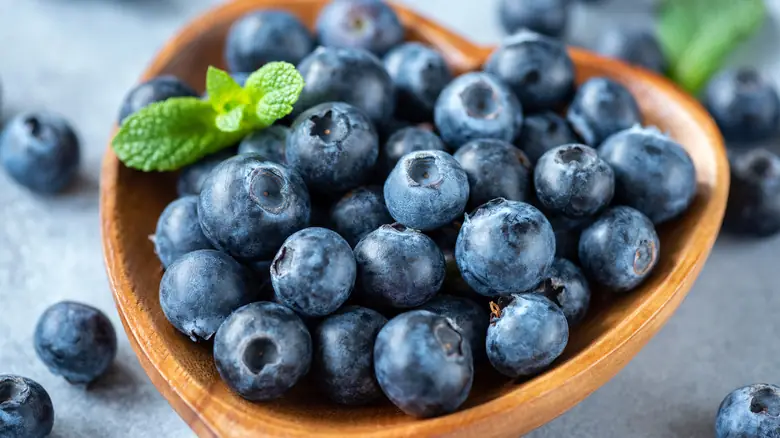
Juicy and delicious, these berries are full of vitamins and bioactive compounds. What are the health benefits of blueberries? Are they good for toddlers? Should pregnant women consult their doctor before including these berries in their diet? Read on, and you will find the answers to all these and numerous other questions.
Health Benefits of Blueberries
Low in calories and incredibly tasty, blueberries make an excellent — and very healthy — snack. Here is why you should include them in your daily ration.
Non-Caloric and Full of Vitamins
A cup of these berries (about 148 grams) contains only 84 calories: you can pop them into your mouth one after another with no risks of putting on weight. What’s more, blueberries are rich in vitamin C (an important antioxidant and immune system booster), vitamin K (required for bone health and essential for blood coagulation), and manganese (extremely important for numerous enzymes).
While fresh blueberries are the best possible choice, these freeze-dried berries come in a convenient resealable bag that you can take anywhere you go.
Just Blueberries by Karen’s Naturals
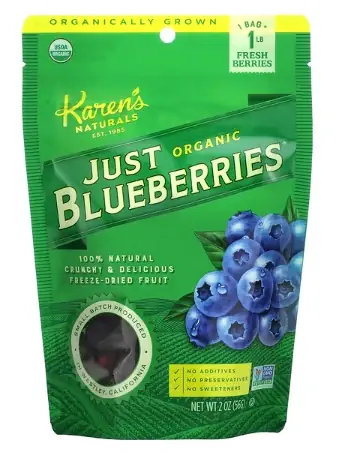
- 56 g (2 oz)
- Organically Grown
- No additives, preservatives & sweeteners
Contain Dietary Fiber
A cup of these berries contains about 4 grams of dietary fiber. i.e., organic compounds that your digestive system cannot break down. Dietary fiber is important in two ways. First, it helps you achieve satiety while providing zero calories which is important if you want to shed pounds or simply avoid weight gain. Second, it serves as food for beneficial bacteria that live in your gut. Not only do these microorganisms help your gut health, but they have also been proven to assist your immune system as well.
Rich in Natural Antioxidants
These berries get their color from organic pigments called anthocyanins which are known to have antioxidant properties. In fact, an abundance of anthocyanins makes blueberries (along with blackberry and raspberry — their botanical relatives) one of the most potent antioxidant foods.
Medical research into the properties of these berries confirms that they can protect your cells and DNA from free radicals. Thus, in a 2002 study it was demonstrated that their consumption leads to increased concentrations of antioxidant compounds in blood serum. In a 2007 study people who drank blueberry/apple juice every day for four weeks were found to be 20% better protected from oxidative DNA damage. Two studies carried out in 2010 and 2013 made it clear that blueberries can significantly lower the oxidation of ‘bad’ LDL cholesterol (a major risk factor for heart disease).
May Help Lower Blood Pressure and Prevent Heart Disease
In a 2010 study participants with obesity who consumed 50 grams (about a third of a cup) of these berries per day experienced a small but measurable (about 4-6%) reduction in blood pressure. A similar 2015 study that involved postmenopausal women confirmed these findings.
A combined effect of blood pressure reduction and prevention of LDL cholesterol oxidation can potentially result in heart disease prevention. Thus, a 2013 study that involved 93,600 young and middle-aged women (nurses) made a conclusion that those participants who consumed high quantities of anthocyanins demonstrated the lowest risks of heart attacks. While additional research is required, these preliminary findings are extremely promising.
May Have Anti-Diabetes Effects
Blueberries offer two important advantages for people with diabetes. First, they don’t contain much sugar. Second, they have positive effects on glucose metabolism and insulin sensitivity, as confirmed by numerous studies.
May Accelerate Muscle Recovery
Although additional research is required, blueberry consumption helped female athletes to speed up the rate of muscle recovery in a 2012 study.
May Prevent Urinary Tract Infections
Blueberry products are currently being studied for their impact on urinary tract infections. As they are genetically close to cranberries, they may have similar effects on various urinary tract pathogens.
May Help Protect Brain Function
Antioxidant properties of anthocyanins can be highly beneficial for the brain and nervous system.
In a 2014 review of animal studies that focused on the neuroprotective effects of berries (including blueberries), a conclusion was made that a blueberry-rich diet can enhance cognitive function and therefore be of help to multiple sclerosis patients.
Research on human participants confirms this hypothesis. In a 2010 study that involved older adults, blueberry supplementation proved to improve memory. A 2012 study makes a conclusion that blueberry- and strawberry-rich diets can slow down the rate of cognitive decline by approximately 2.5 years.
To get as many health benefits from blueberries as possible, you might want to use potent blueberry concentrate alongside the berries themselves. Here is one of such products that comes from a reliable brand:
Blueberry Concentrate by Sports Research
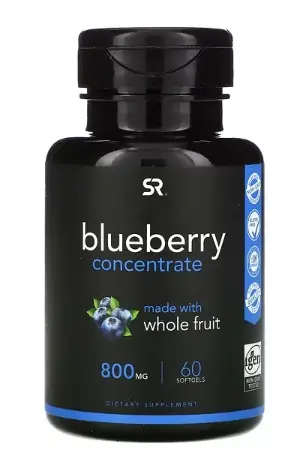
- 60 softgels
- 800 mg of concentrate per softgel
- Made from whole berries
What Health Benefits Does Blueberry Tea Have?
Although this claim can be found in numerous sources, what is typically called the main health benefit of blueberry tea — high vitamin C content — is a bit of an exaggeration. Vitamin C is a heat-sensitive compound that breaks down quickly in hot water.
On the positive side, this fragrant and delicate tea contains a significant quantity of anthocyanins and other polyphenols, and, therefore, is bound to have antioxidant properties. Then again, the concentrations of these bioactive compounds in tea are considerably lower compared to the berries themselves, so it is always a good idea to have a diet that includes both juicy berries and tea from them.
There are two main types of blueberry tea on the market. First, you can buy green/black tea blended with blueberry pieces:
Blueberry Green Tea by Harney & Sons
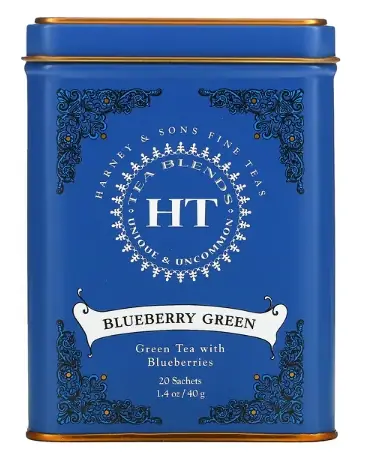
- 20 sachets
- One sachet is enough for two cups of tea
- Contains blueberry pieces
Second, you can decide on fruit/herbal tea with blueberry in it:
Blueberry Wild Child by Tiesta Tea Company
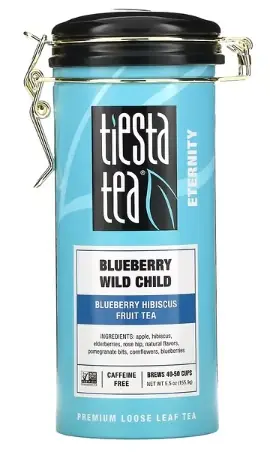
- 155.9 grams (5.5 oz)
- Contains apples, blueberries, hibiscus
What Are the Health Benefits of Blueberries and Bananas?
If you want to make your breakfast cereal healthier, consider adding to it a sliced banana and a handful of blueberries. You will get a double dose of dietary fiber, manganese, and vitamin C (from both berries and bananas), a large quantity of vitamin B6, potassium, and magnesium (from bananas), and a considerable amount of vitamin K (from berries). What’s more, bananas are a good source of energy that you especially need in the first half of the day.
Then again, as neither of these foods contains measurable amounts of protein, it is important that you have a healthy amount of protein-rich food for lunch.
What are the Health Benefits of Blueberries During Pregnancy
First of all, if eaten in normal quantities, these berries are considered safe for pregnant women. Still, as they are rich in vitamin K, which helps blood clotting, large portions of blueberries can, in theory, change the action of blood-thinning medications that contain warfarin (like Coumadin). While the actual risks of such interaction are believed to be small, to be on the safe side if you are pregnant and taking Coumadin, consult your doctor about the quantities of these berries that you are allowed to take.
While blueberries are sometimes said to be good for pregnant women because they contain folate (vitamin B9, which helps to prevent neural tube defects in newborn babies) and potassium (which helps to control hypertension), these claims are really an exaggeration. Actual quantities of both these compounds in blueberries are rather small (only about 2% of your daily need per 100 grams); what’s more, there are much better dietary sources of both potassium and folate — like, for instance, avocado.
The real benefits of blueberries — except that they are rich in natural antioxidants — lie in the fact that they make an excellent snack and can be especially helpful if you have hunger pangs. If you want to satisfy your cravings and, at the same time, avoid overeating and getting too many calories, these berries will be the right choice.
What Are the Health Benefits of Blueberries for Toddlers?
As these juicy berries are rich in both dietary fiber and water, they make an ideal remedy for constipation. Kids usually like their taste, so you will have no problem making them eat up to ½ cup of these berries over the course of the day. What’s more, as a blueberry allergy is a rare condition, the risks of adverse reactions are small.
You need to keep in mind, though, that whole berries remain a choking hazard until your baby is old enough to chew completely. Use your blender or food processor to turn whole berries into a delicious purée.Now you know what are the health benefits of blueberries. Although not a magic bullet, they can help you get slim and full of energy: add them to your breakfast and use them as a snack during the day.